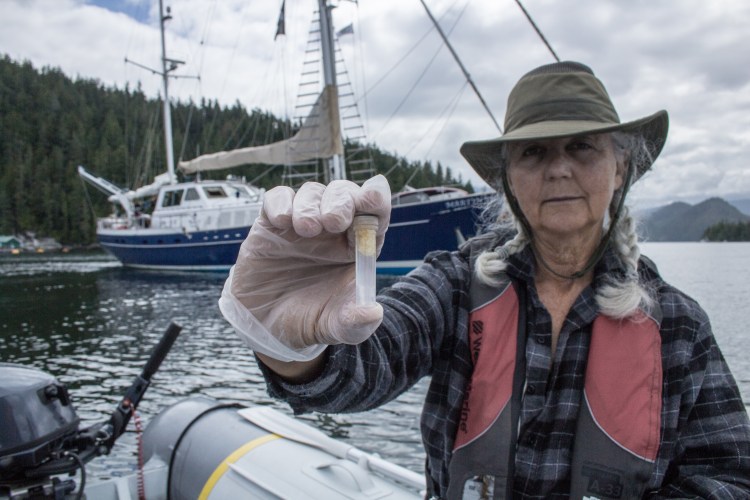Salmon Farm Research Reveals Alarming Effects on BC’s Ecosystem
Published by Sea Shepherd Conservation Society
Preliminary lab testing for the presence of piscine orthoreovirus (PRV), delivered 100 percent positive results in samples collected from open-net fish farms in British Columbia
Vancouver, BC, August 22nd, 2018 – For the past two months Sea Shepherd’s research vessel the R/V Martin Sheen has ventured to every salmon farm on the Fraser sockeye salmon migration route between Vancouver and Alert Bay with Canadian scientists on board, collecting samples to determine the impact of salmon farms on wild fish populations. One of the scientists is independent biologist Alexandra Morton, who has been investigating the link between open-net fish farms, sea lice, viruses, and the decline of wild salmon populations for three decades.
Morton has collected farm salmon tissue and feces from the waters adjacent to approximately half of British Columbia’s open-net salmon farms. This is part of her ongoing research into the spread of farm salmon viruses into wild salmon habitat.
“I have results from the first five farms sampled this summer, all from the Discovery Islands,” reports Alexandra Morton, “100 percent were positive for piscine orthoreovirus,”
A large portion of the Fraser sockeye is currently migrating past these infected farms.
Earlier this summer Justice Maisonville ruled against Marine Harvest, granting Morton the right to approach the farms to collect samples however the Department of Fisheries and Oceans (DFO) refused to grant her a scientific license to test shellfish near farms, Morton therefore developed the novel method of collecting tissue from dead farm salmon that is drifting out of the pens.

“In my experience, DFO and industry will try to obstruct any science that measures the impact of salmon farms on wild salmon,” says Morton, “but I believe this work is critical to the survival of wild salmon and whales on the BC coast.”
By law, the Minister of Fisheries and Oceans (DFO) can only issue a license allowing fish farmers to transfer fish if they “do not have any disease or disease agent that may be harmful to the protection and conservation of fish.” In 2015, Alexandra Morton sued DFO for the second time for issuing licenses to Marine Harvest Canada Inc. to transfer farm fish carrying PRV into the open-net fish farms. Morton won the first case, but DFO refuses to acknowledge the court ruling. On September 10th, Morton will be in court once again, this time joined by the Namgis First Nation, to demand Canadian law be enforced, as Atlantic salmon are still not being screened for PRV before transfer into farms on the migration routes of wild salmon, with no filtration or containment of the waste.
Most farmed salmon sold in markets is infected with PRV as per research published in PloS One, on December 3rd 2017[i]. Most salmon farmed in B.C is exported to the United States. There are no studies on the effect of piscine orthoreovirus on humans, despite farmed salmon being consumed raw in sushi restaurants.
The results from Sea Shepherd’s Operation Virus Hunter III are extremely concerning. A paper published in the journal FACETS2 earlier this year describes how PRV invades and bursts the blood cells of Chinook salmon causing organ failure, severe jaundice and release of the virus into marine habitats.
Chinook salmon are the primary source of food for British Columbia’s critically endangered southern resident orca whales. The plight of these orcas received global media attention when a grieving female, known as J35, carried her dead calf with her for 17 days in a prolonged display of grief. This pod is showing signs of starvation due to the lack of Chinook salmon from the Fraser River[ii] and has not had a successful live birth in several years. The preliminary results reported here suggest salmon farms could be having significant impact on Chinook salmon and the southern resident orca.
Read the full article at: https://seashepherd.org/2018/08/22/salmon-farm-research-reveals-alarming-effects-on-bcs-ecosystem/






